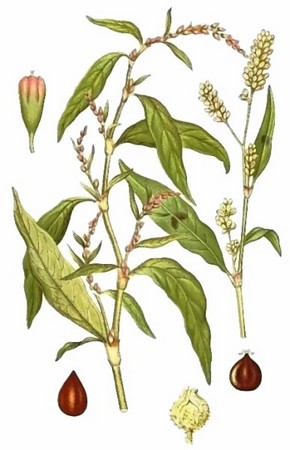Highlander pepper – Water pepper – The water pepper.
Annual herbaceous plant 50-70 cm high, families grechishnыh (Polygonaceae). Grows everywhere, with the exception of the Far North, For medical purposes make El part plants-grass.

Highlander peppery – Chemical composition
Pepper herb contains flavonoids (giperozid, Quercetin, quercitrin, rutin, rhobinine, which, rhamnazine and isorhamnetin), tannins, vitamins A, D, IS, K, ascorbic acid, organic acid (formic, acetic), glycoside polytopinerin.
Highlander pepper – Pharmacological properties
Galenic preparations of the mountaineer pepper have hemostatic properties. Compound, acting antihemorrhagically, in the grass of the plant has not yet been identified; known only, that this property is potentiated by tannins and certain polyphenolic compounds, that interact with plasma proteins, clog damaged small vessels and capillaries in the gastrointestinal tract and inhibit bleeding, also slightly increase blood clotting. Besides, volatile essential oil slightly lowers blood pressure. Flavonoid compounds reduce the permeability of the vascular wall of arterioles and capillaries. The hemostatic effect of the mountaineer is combined with the ability to stimulate contractions of the muscles of the uterus like ergot, however, these properties in the mountaineer pepper are much weaker.
Due to the content of tannins in the plant, there is a slight antidiarrheal and antimicrobial effect of galenic preparations., however, it is not significant. Herbal preparations of the plant also have some cardiotonic and diuretic properties and slightly increase the tone of peripheral vessels..
Highlander pepper – Use in medicine
Galenic forms of mountaineer pepper are successfully used in obstetric and gynecological practice for postpartum uterine bleeding., when the uterus subinvolution, prolonged and heavy menstruation. Besides, infusions and extracts of the plant are prescribed for bleeding from small vessels and capillaries of the stomach, bowel, as well as with non-abundant hemorrhoidal bleeding.
However, preparations of mountaineer pepper are rarely used on their own at the present time.. Usually they are used as an aid in complex therapy for uterine and internal bleeding..
Knotweed grass is sometimes used for diarrhea and enterocolitis in combination with various medicinal plants.. In complex collections, the grass of the mountaineer is prescribed for patients with chronic colitis, accompanied by erosive and ulcerative lesions of the mucous membrane, as well as for the treatment of hemorrhoids. The grass of the mountaineer pepper as part of a collection of medicinal plants is used to prepare baths for external treatment of hemorrhoids..
Highlander pepper – Formulations, Dosing and Administration
Water pepper extract liquid. Transparent green-brown liquid with a fragrant odor, bitter astringent taste. Assign 30-40 drops 3-4 times a day as a hemostatic agent.
Water pepper herb infusion: 20 g (2 tablespoons) raw material is placed in an enamel bowl, Pour 200 ml (1 glass) hot boiled water and heated in boiling water (in a water bath) 15 m. cooled at room temperature for 45 m, filter, the remaining raw materials squeeze. The volume of the resulting infusion was adjusted with boiled water to 200 ml. The prepared infusion stored in a cool place no more than 2 d.
Take 1/3 cup 3-4 times a day before meals as a hemostatic agent.
The raw material stored in a dry, cool place.
